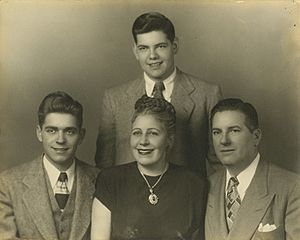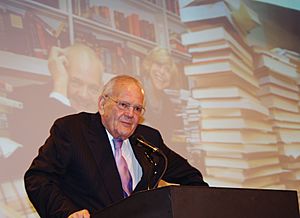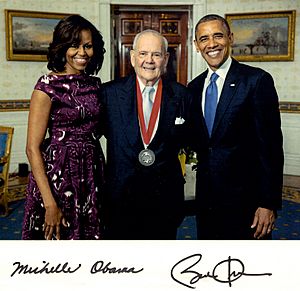Robert B. Silvers facts for kids
Quick facts for kids
Robert B. Silvers
|
|
|---|---|
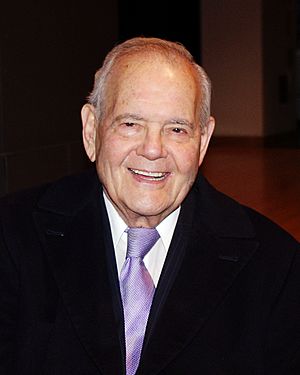
Silvers at the National Book Critics Circle Awards in March 2012
|
|
| Born |
Robert Benjamin Silvers
December 31, 1929 |
| Died | March 20, 2017 (aged 87) |
| Education | University of Chicago, 1947 |
| Occupation | Editor |
|
Notable work
|
The New York Review of Books |
Robert Benjamin Silvers (December 31, 1929 – March 20, 2017) was an American editor. He was best known for being the editor of The New York Review of Books from 1963 until his death in 2017. He helped shape how people thought about books and important ideas for over 50 years.
Contents
Robert Silvers: Early Life and Career
Robert Silvers was born in Mineola, New York, and grew up in Farmingdale, New York and Rockville Centre, New York. His father, James, was a salesman. His mother, Rose, was a writer and one of the first female radio hosts. Robert graduated from the University of Chicago at just 17 years old in 1947. He also studied at Yale Law School.
After college, Silvers worked for Connecticut Governor Chester Bowles. During the Korean War, he served in the United States Army in Paris. There, he wrote speeches and helped with press. He also continued his studies at the Sorbonne and Sciences Po.
Becoming an Editor
In Paris, Silvers met George Plimpton, who was starting a new magazine called The Paris Review. Silvers joined as an editor. Plimpton later said that Silvers "made The Paris Review what it was." In 1958, Silvers moved back to New York. He became an associate editor at Harper's Magazine.
While at Harper's, he published an essay by Elizabeth Hardwick. This essay, "The Decline of Book Reviewing," talked about how book reviews needed to be better. It later inspired the creation of The New York Review of Books.
Leading The New York Review of Books
During a newspaper strike in New York City in 1962-1963, many newspapers stopped printing. This meant there was no place for book publishers to advertise new books. Jason Epstein and Barbara Epstein, along with Elizabeth Hardwick and Robert Lowell, saw a chance to start a new kind of book review magazine. They asked Robert Silvers to be the editor.
Silvers and Barbara Epstein became co-editors of The New York Review of Books. They worked together for 43 years, until Barbara Epstein passed away in 2006. After that, Silvers was the only editor until his own death in 2017.
What Made the Review Special
Silvers believed in publishing "marvelous, intensely interesting, important questions." He wanted to deal with these questions in an exciting way. He often said they did what they wanted and didn't try to guess what the public wanted.
Philip Marino from Liveright Publishing said Silvers was like a chemist. He would pair the right writer with the right topic. This was to create exciting and insightful results. Writers like Daniel Mendelsohn agreed, saying Silvers would connect writers with material they might not have thought was right for them.
Silvers also edited many collections of essays. These books covered various topics, from science to the performing arts. He also appeared in a 2014 documentary film about the Review, called The 50 Year Argument.
Robert Silvers' Personal Life
Robert Silvers never married or had children. For over 40 years, he lived with Grace, Countess of Dudley. They both loved opera. Silvers said that Grace's "fineness of mind and spirit has been the center of my life." He was also a pescetarian, meaning he ate fish but no other meat. He was inspired by the writings of philosopher Peter Singer on animal rights.
Robert Silvers passed away on March 20, 2017, at the age of 87, after a short illness.
Robert Silvers' Reputation and Impact
Many people admired Robert Silvers. John Richardson said that Jason Epstein called Silvers "the most brilliant editor of a magazine ever." The Guardian newspaper called him "the greatest literary editor there has ever been."
The New York Times described him as a "voracious polymath" (someone who knows a lot about many different subjects). They also called him an "obsessive perfectionist." Under his leadership, The New York Review of Books became one of the most important intellectual magazines in the United States. It featured long, thoughtful essays on literature and politics by famous writers.
Author Louis Begley said Silvers was the "ideal editor." He explained that Silvers knew everything worth knowing and that his edits were very careful and precise. Roger Cohen noted that Silvers had an amazing eye for unclear thinking. He was also very strict about making sure facts were accurate.
Encouraging Writers and Ideas
Silvers loved good writing. He would get excited when talking about writers he admired. He wanted them to create something "special and revealing." He encouraged writers to make each review a strong intellectual argument. He also enjoyed pairing writers with books that might challenge their own views.
Professor Peter Brown said that reviewing for Silvers was like being "doused in the sheer, bubbling delight of Bob’s own unquenchable enthusiasm."
Silvers believed that exploring "the great political issues of power and its abuses" was important. The New York Times noted that he made human rights and questioning government power his main focus. He believed that being skeptical of the government was a very important viewpoint.
Silvers was also known for hiring and helping young assistants. Many of them later became famous in journalism, academics, and literature. These included Jean Strouse and Deborah Eisenberg. Two of his former assistants, Gabriel Winslow-Yost and Emily Greenhouse, became co-editors of the Review in 2019.
How Robert Silvers Worked
People often talked about Silvers' amazing work habits. Jonathan Miller said he was "conscientious beyond the call of duty." He would often work until two in the morning. He was always meeting people and discussing ideas.
Writer Claire Messud was impressed that Silvers would read the novels she reviewed very carefully. He would gently point out small mistakes, like attributing a quote to the wrong character. She said he was "unfailingly generous and kind." He would suggest changes rather than demand them.
Emily Stokes from the Financial Times wrote that Silvers saw editing as an "instinct." He would choose writers carefully and try to guess what they needed. He would send them books and news articles. He always looked for clearer, more complete, and fresh writing. Silvers believed an editor should not be influenced by friendships with authors. He also had to sometimes reject reviews if they weren't good enough.
Silvers would edit each piece multiple times. He would sharpen the arguments, ask for more evidence, and remove confusing words. His obituary in The New York Times said he had a "priestly sense of devotion" to his work. He arrived early and left late, often finding new writers and ideas at social events.
Robert Silvers' Lasting Impact
When Robert Silvers passed away, The New York Review of Books had over 130,000 readers. It was known as "the country’s best and most influential literary journal." The 2014 documentary film The 50 Year Argument about the Review was centered around Silvers.
In 2019, Silvers' family created the Robert B. Silvers Foundation. This foundation supports writers who focus on deep political, social, economic, and scientific topics. It also supports arts and literary criticism. The foundation gives out annual awards called the Silvers-Dudley Prizes. These prizes recognize excellent writing in journalism, criticism, and European culture.
Silvers was also involved in helping libraries in New York City. The New York Public Library hosts annual Robert B. Silvers lectures. These lectures are given by experts in literature, arts, politics, history, and science. Famous speakers have included Joan Didion, J. M. Coetzee, and Paul Krugman.
Honors and Awards
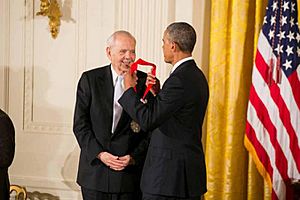
Robert Silvers received many awards for his work.
- In 2006, he and Barbara Epstein received the National Book Foundation's Literarian Award. This award recognized their outstanding service to the American literary community.
- They also received an Award for "Distinguished Service to the Arts" from the American Academy of Arts and Letters.
- In 2011, the National Book Critics Circle gave Silvers the Ivan Sandrof Award for Lifetime Achievement in Publishing.
- In 2012, he received the Hadada Prize from The Paris Review. He also received a "N.Y.C. Literary Honor" for his contributions to literary life in New York City.
- In 2013, the French-American Foundation gave him the Vergennes Achievement Award.
- Also in 2013, President Barack Obama awarded him the National Humanities Medal. This was for "offering critical perspectives on writing" and for making the book review an art form.
Silvers was also a member of important organizations like the PEN American Center and the Council on Foreign Relations. He was a Chevalier of the French Légion d’honneur and a member of the French Ordre National du Mérite. These are high honors from France. He was elected a Fellow of the American Academy of Arts and Sciences in 1996. He also received honorary degrees from Harvard University, the University of Oxford, and Columbia University.


